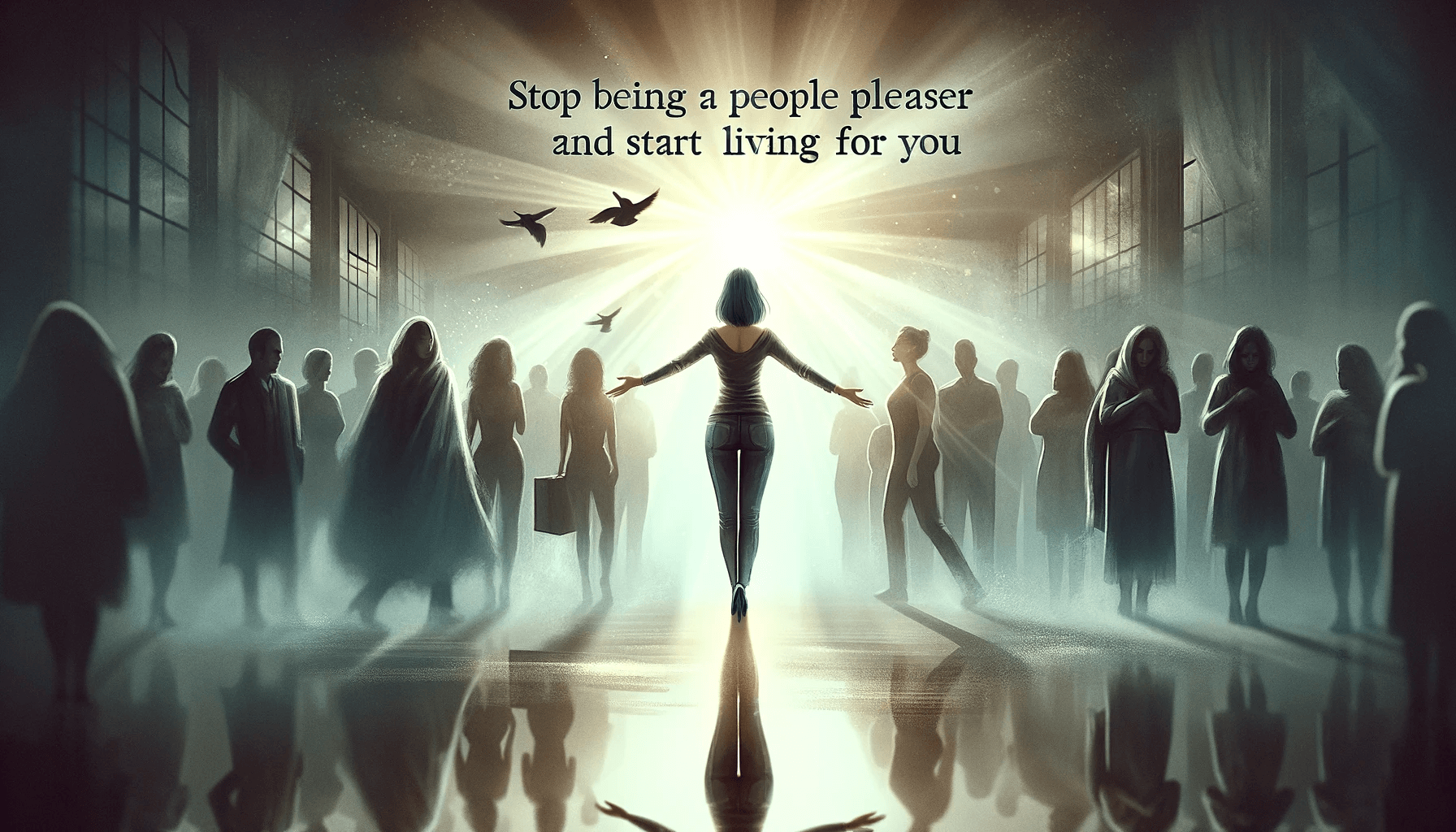Sponsor Awaken Your Great Self
Table of Contents
Understanding the People Pleaser Mindset
As a recovering people pleaser, I know firsthand the challenges of constantly seeking validation and approval from others. The people pleaser mindset is driven by a deep fear of rejection and a desire to be liked by everyone. We often put the needs and wants of others before our own, sacrificing our happiness and well-being in the process.
The Negative Effects of Being a People Pleaser
Being a people pleaser can negatively affect an individual’s life and well-being. Here are some key drawbacks:
- Loss of Personal Identity: Constantly trying to please others can lead to losing personal identity. People pleasers often suppress their own needs, desires, and values to accommodate others, which can result in a diminished sense of self.
- Stress and Burnout: Meeting everyone’s expectations can be incredibly stressful. The fear of disappointing others can lead to overcommitting and overextending oneself, eventually leading to burnout.
- Difficulty in Making Decisions: People pleasers often struggle with decision-making, as they are overly concerned with how their choices affect others. This can lead to indecisiveness and reliance on others to make choices.
- Resentment: Over time, consistently putting others’ needs above one’s own can lead to resentment towards oneself and others. This resentment can strain relationships and impact mental health.
- Manipulation and Abuse: People pleasers are often targeted by manipulative individuals who take advantage of their desire to please. This can lead to abusive relationships and situations where the people pleaser is exploited.
- Poor Mental Health: Chronic people-pleasing behavior can contribute to anxiety, depression, and low self-esteem. The constant worry about pleasing others and the fear of rejection or disapproval can take a toll on mental health.
- Neglect of Personal Needs: People pleasers often neglect their needs, whether skipping meals, sacrificing sleep, or forgoing personal hobbies and interests. This neglect can affect physical and emotional well-being.
- Damaged Relationships: Ironically, the effort to please everyone can sometimes have the opposite effect. Relationships can suffer when there’s a lack of authenticity or when the people pleaser becomes resentful or burnt out.
Signs That You Are a People Pleaser
Recognizing that you are a people pleaser is important in understanding your behavior and its impact on your life. Here are some signs that may indicate you tend to be a people pleaser:
- Difficulty Saying No: You find it hard to refuse requests or say no to others, even when it’s inconvenient or detrimental to your own needs or schedule.
- Excessive Apologizing: You often find yourself apologizing to avoid conflict or keep others happy even when you haven’t done anything wrong.
- Needing Validation: You seek constant approval and validation from others and feel anxious or upset if you think someone is displeased with you.
- Avoiding Conflict: You go to great lengths to avoid disagreements or confrontations, often at the expense of your opinions or comfort.
- Overcommitting Yourself: You have a habit of taking on more than you can handle because you can’t bear to disappoint people or have them think poorly of you.
- Prioritizing Others’ Needs Over Yours: Your needs, desires, and goals often take a backseat to those of others. You might even feel guilty for attending to your own needs.
- Fear of Rejection: A deep fear of being disliked or rejected drives many of your actions. You might change your behavior or suppress your true feelings to fit in or be accepted.
- Lack of Assertiveness: You need help asserting your opinions or expressing your needs, often agreeing with others even when you disagree.
- Feeling Responsible for Others’ Happiness: You must keep everyone around you happy and take it personally if someone is upset or displeased.
- Neglecting Self-Care: You might neglect your self-care, hobbies, and interests because you’re too busy to please others.
- Difficulty Making Decisions: You may have difficulty making decisions, especially if they could upset or disappoint others.
- Feeling Burnt Out or Resentful: You often feel exhausted or resentful because of the constant effort to meet others’ expectations and needs.
Why It’s Important to Stop Being a People Pleaser
While breaking free from the people pleaser mindset may be difficult, it is essential for our well-being and personal growth. When constantly seeking approval from others, we lose touch with our desires and goals. We become disconnected from our authentic selves and live our lives according to the expectations of others. To live a fulfilling and meaningful life, it is crucial to stop being a people pleaser and start living for ourselves.
How to Stop Being a People Pleaser
Recognize Your Own Needs and Desires
The first step in breaking free from the people pleaser mindset is recognizing and acknowledging your needs and desires. Take some time to reflect on what truly matters to you and what brings you joy and fulfillment. This self-awareness is the foundation for reclaiming your voice and living true to yourself.
Set Boundaries and Learn to Say No
Setting boundaries is crucial in stopping the cycle of people pleasing. Learn to prioritize your needs and say no to things that do not align with your values or bring you joy. It may feel uncomfortable at first, but remember that you have the right to prioritize yourself and your well-being.
Prioritize Self-Care and Self-Compassion
Taking care of yourself is not selfish but necessary for your overall well-being. Make self-care a priority by engaging in activities that bring you joy and relaxation. Practice self-compassion by being kind to yourself and forgiving yourself for perceived “failures.” Remember, you are deserving of love and care just like anyone else.
Surround Yourself with Supportive People
Surrounding yourself with supportive and understanding people is crucial in your journey to stop being a people pleaser. Seek out friends and loved ones who encourage and support you in your quest for self-discovery and personal growth. Share your struggles and successes with them, and let their positive influence inspire and motivate you.
Practice Assertiveness and Self-Expression
Assertiveness is a key skill in breaking free from the people pleaser mindset. Learn to express your thoughts, needs, and desires clearly and assertively. Practice speaking up for yourself and setting boundaries in your relationships and interactions. Remember that your voice and opinions matter, and you have the right to be heard.
Overcoming Challenges and Setbacks in the Journey
Breaking free from the people pleaser mindset is a challenging journey. It is important to acknowledge that there will be challenges and setbacks along the way. It’s okay to make mistakes and stumble along the path to self-discovery. Use these challenges as opportunities for growth and learning. Be patient and gentle with yourself, and remember that progress is not linear.
Celebrating Your Progress and Success
As you embark on this journey of self-discovery and personal growth, remember to celebrate your progress and success. Each step you take towards reclaiming your voice and living for yourself is a significant achievement. Take time to acknowledge and appreciate the positive changes you are making.
Resources and Tools for Personal Growth and Self-Empowerment
Books and eBooks:
- Self-Help and Personal Development: Titles like “The 7 Habits of Highly Effective People” by Stephen Covey, “Awaken the Giant Within” by Tony Robbins, or “The Power of Now” by Eckhart Tolle.
- Psychology and Mindfulness: Books like “Thinking, Fast and Slow” by Daniel Kahneman or “The Untethered Soul” by Michael A. Singer offer insights into the workings of the mind.
- Biographies and Memoirs: Learning from the experiences of others, such as in Michelle Obama’s “Becoming” or Nelson Mandela’s “Long Walk to Freedom”.
Online Courses and Workshops:
- Platforms like Coursera, Udemy, and MasterClass offer a range of courses on personal development, leadership, communication skills, and more.
- Webinars and workshops by experts in various fields.
Meditation and Mindfulness Apps:
- Apps like Headspace, Calm, and Insight Timer offer guided meditations, mindfulness exercises, and sleep stories.
- Many of these apps also offer courses on topics like stress management and personal growth.
Journals and Planners:
- Bullet journals, gratitude journals, or planners like the “Panda Planner” can help organize thoughts, set goals, and track progress.
- Digital tools like Notion or Evernote for organizing life and work.
Podcasts and Audiobooks:
- Podcasts like “The Tim Ferriss Show,” “Oprah’s SuperSoul Conversations,” or “The Tony Robbins Podcast.”
- Audiobooks are available on platforms like Audible or Scribd.
Seeking Professional Help and Support
If you struggle to break free from the people pleaser mindset, don’t hesitate to seek professional help and support. A therapist or coach can provide you with personalized guidance and strategies to overcome the challenges you may face. They can help you navigate your emotions, identify underlying patterns, and develop healthy coping mechanisms.
Conclusion: Embracing a Life True to Yourself
Breaking free from the people pleaser mindset is a courageous and empowering journey. It requires self-awareness, self-compassion, and a willingness to prioritize your needs and desires. By recognizing the negative effects of being a people pleaser and implementing strategies to stop this pattern, you can reclaim your voice and live a true life. Remember, you deserve to be happy and fulfilled; your needs and desires are just as important as anyone else’s. Embrace this self-discovery and personal growth journey, and watch as your life transforms in beautiful and unexpected ways.
CTA: If you’re ready to stop being a people pleaser and start living for yourself, take the first step today. Reflect on your needs and desires, set boundaries, prioritize self-care, and seek support when needed. Embrace the journey of self-discovery and personal growth, and unlock the freedom to live a life true to yourself.




